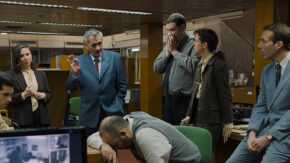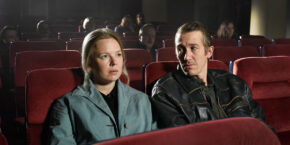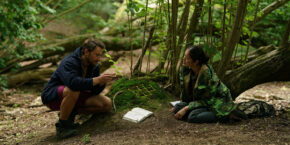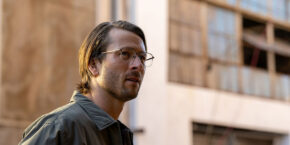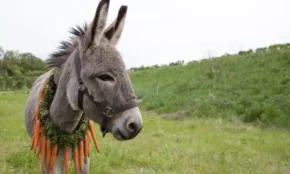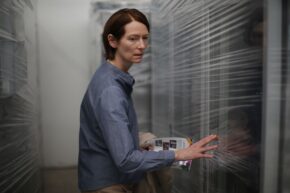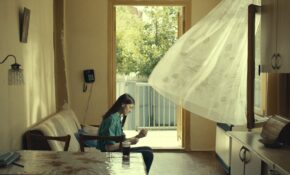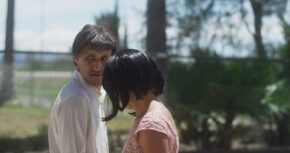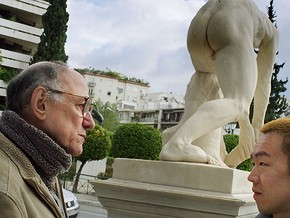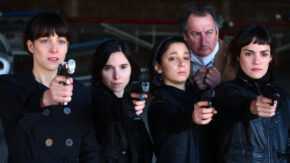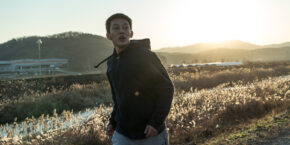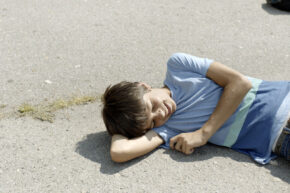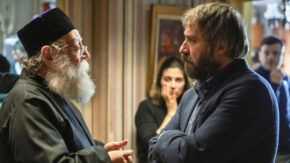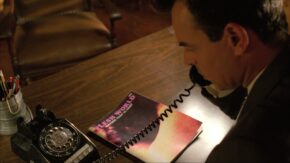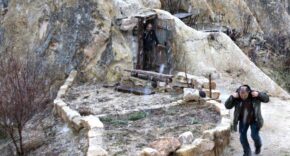Jordan Cronk
Objects of Desire: Rodrigo Moreno on “The Delinquents”
By Jordan Cronk | 01/18/2024 | CS97, From Cinema Scope Magazine, Interviews
Until recently a somewhat forgotten figure of the New Argentine Cinema, director Rodrigo Moreno has, with The Delinquents, asserted himself as perhaps that movement’s most underestimated talent.
Read More → TIFF 2023 | The Beast (Bertrand Bonello, France/Canada) — Special Presentations
By Jordan Cronk | 09/05/2023 | Cinema Scope Online, TIFF 2023
By Jordan Cronk With his tenth fiction feature, The Beast, French director Bertrand Bonello parlays his longstanding interest in the reverberations of history into a stark vision of the future. Starring Léa Seydoux and George MacKay as doomed lovers Gabrielle and Louis, the film follows the couple in multiple incarnations across the three distinct time…
Read More → TIFF 2023 | Do Not Expect Too Much from the End of the World (Radu Jude, Romania/Luxembourg/France/Croatia) — Wavelengths
By Jordan Cronk | 09/05/2023 | Cinema Scope Online, CS96, From Cinema Scope Magazine, Interviews, TIFF 2023
Where for many filmmakers the pandemic discouraged production or curbed creativity, it only seems to have inspired Radu Jude. Always impossible to peg, the prolific 46-year-old Romanian director has grown especially wily and provocative in recent years, embarking on a new phase in his career in which contemporary image culture and the sociopolitical absurdities of our time have become both subject of meticulous analysis and object of equally attentive ridicule.
Read More → TIFF 2023 | Fallen Leaves (Aki Kaurismäki, Finland/Germany) — Centrepiece
By Jordan Cronk | 09/05/2023 | Cinema Scope Online, CS95, TIFF 2023
At 81 minutes, Aki Kaurismäki’s Fallen Leaves was the shortest film in a bloated Cannes competition. It was also among the best, accomplishing more with less (and in less time) than any number of overwrought productions, a notion evidently shared by at least some members of Ruben Östlund’s jury, which awarded the film its namesake third runner-up prize, making this only the second honour Kaurismäki’s received from Cannes after winning the Grand Prix for The Man Without a Past in 2002.
Read More → TIFF 2023 | Green Border (Agnieszka Holland, Poland/Czech Republic/France/Belgium) — Centrepiece
By Jordan Cronk | 09/05/2023 | Cinema Scope Online, TIFF 2023
By Jordan Cronk Polish director Agnieszka Holland’s best film in years falls into that most familiar of modern day genres: the migrant drama. Co-written by Holland, Maciej Pisuk, and Gabriela Łazarkiewicz-Sieczko (and directed in collaboration with Kamila Tarabura and Katarzyna Warzecha), Green Border is set on the threshold of Poland and Belarus, where, beginning in…
Read More → TIFF 2023 | Here (Bas Devos, Belgium) — Wavelengths
By Jordan Cronk | 09/05/2023 | Cinema Scope Online, CS95, TIFF 2023
A film of uncommon warmth and delicacy, Bas Devos’ Here confirms a newfound sense of style and maturity in the Belgian filmmaker’s work that first appeared in the finely tuned nocturne Ghost Tropic (2019). Like that clearly pivotal project, Devos’ fourth feature—which won the top prize in the Encounters section at this year’s Berlinale—finds the 39-year-old director levelling up by scaling down.
Read More → TIFF 2023 | Hit Man (Richard Linklater, US) — Special Presentations
By Jordan Cronk | 09/05/2023 | Cinema Scope Online, TIFF 2023
By Jordan Cronk More than any American filmmaker of his generation, Richard Linklater has made a career out of alternating between personal and commercial directorial projects. That these more mainstream offerings don’t suffer as frequently or as dramatically as do any number of comparable efforts by his contemporaries speaks to the integrity of Linklater’s approach…
Read More → The Sea Inside: Helena Wittmann on Human Flowers of Flesh
By Jordan Cronk | 04/19/2023 | Cinema Scope Online, CS92
By Jordan Cronk Among a new generation of German filmmakers, Hamburg’s Helena Wittmann is uniquely elemental, even primal, in her concerns. For over a decade, the 39-year-old artist has been exploring the outer reaches of cinematic storytelling through the medium’s singular ability to transform not only space and time, but also the spectator’s relationship with…
Read More → TIFF 2022 | EO (Jerzy Skolimowski, Poland/Italy) — Contemporary World Cinema
By Jordan Cronk | 09/06/2022 | Cinema Scope Online, TIFF 2022, TIFF Coverage & Reviews
By Jordan Cronk Published in Cinema Scope #91 (Summer 2022) When Jerzy Skolimowski cancelled his press commitments at Cannes to promote his new feature, EO, he denied critics and cinephiles an explanation behind the festival’s most mystifying entry. All but engineered to prompt bemusement, the film, a bold, modern-day reimagining of Bresson’s Au hasard Balthazar (1966), is…
Read More → EO (Jerzy Skolimowski, Poland/Italy)
By Jordan Cronk | 06/21/2022 | CS91, Festivals, From Cinema Scope Magazine, Spotlight
When Jerzy Skolimowski cancelled his press commitments at Cannes to promote his new feature, EO, he denied critics and cinephiles an explanation behind the festival’s most mystifying entry. All but engineered to prompt bemusement, the film, a bold, modern-day reimagining of Bresson’s Au hasard Balthazar (1966),is one whose mysteries are in fact part and parcel of its allure.
Read More → I Remember Everything: Apichatpong Weerasethakul’s Memoria
By Jordan Cronk | 09/20/2021 | CS88, From Cinema Scope Magazine, Interviews
Memoria arrives amidst a flurry of activity for the 51-year-old Thai filmmaker. In addition to the feature and the book, there’s Night Colonies, his contribution to the omnibus project The Year of the Everlasting Storm (which also premiered at Cannes); a solo exhibition of his video and installation work at the IAC Villeurbanne; and a career-spanning retrospective at FIDMarseille, where the director was on hand just days after Cannes to receive the festival’s Grand Prix d’Honneur.
Read More → TIFF 2021 | Memoria (Apichatpong Weerasethakul, Colombia/Thailand/ UK/France/Germany/Mexico)
By Jordan Cronk | 09/08/2021 | Cinema Scope Online, TIFF 2021, TIFF Coverage & Reviews
By Jordan Cronk Published in Cinema Scope #88 (Fall 2021) “When he came to, the present was almost intolerable in its richness and sharpness, as were his most distant and trivial memories…Now his perception and his memory were infallible.”—Jorge Luis Borges, “Funes the Memorious” Amongst the research materials, set photographs, email correspondence, and treatment excerpts…
Read More → It Happened One Night: Alexandre Koberidze on What Do We See When We Look at the Sky?
By Jordan Cronk | 06/15/2021 | CS87, From Cinema Scope Magazine, Interviews
Just past the midpoint of Alexandre Koberidze’s What Do We See When We Look at the Sky? the narrative pauses for a five-minute montage of children playing European football on the blacktop of a fenced-in basketball court. Accompanied by Gianna Nannini’s 1990 FIFA World Cup anthem “Un’estate italiana,” the scene, which plays out entirely in slow motion, is at once part and parcel of this highly musical film’s many interludes and the most conspicuous of its untold number of narrative culs de sac.
Read More → En plein air: Denis Côté on Hygiène sociale
By Jordan Cronk | 03/25/2021 | CS86, From Cinema Scope Magazine, Interviews
No mere pandemic film (the script was largely written in 2015), Côté’s latest instead turns our current circumstances into a means for reflection, analysis, and confrontation with the very tools and convictions that have made him into one of contemporary cinema’s most prolific and unclassifiable directors. At a time when the very concepts of serious-minded filmmaking and theatrical exhibition are being called into question by streaming giants and IP managers with zero investment in the sustainability of the art form, Côté proposes that what’s needed if the cinema is to survive is not a reckoning with the notion of what is or isn’t a movie, but a re-engagement with the tenets of an author-driven cinema, achieved on its own unique terms.
Read More → Her Socialist Smile (John Gianvito, US)
By Jordan Cronk | 12/22/2020 | Columns, CS85, Fall Festival Spotlight, From Cinema Scope Magazine
By Jordan Cronk In a year when even the most perfunctorily political film has been deemed newly relevant, it’s a 58-minute observational documentary from 2007 that, by quietly surveying the United States’ progressive past, points most perceptively to the struggle that has faced the American Left since long before 2020. A history of violence and…
Read More → Reconstructing Violence: Nicolás Pereda on Fauna
By Jordan Cronk | 09/22/2020 | CS84, From Cinema Scope Magazine, Interviews
There’s a point in nearly every Nicolás Pereda film when the narrative is either reoriented or upended in some way. In the past this has occurred through bifurcations in story structure or via ruptures along a given film’s docufiction fault line. Pereda’s ninth feature, Fauna, extends this tradition, though its means of execution and conceptual ramifications represent something new for the 38-year-old Mexican-Canadian filmmaker.
Read More → TIFF 2020: Fauna (Nicolás Pereda, Mexico/Canada)
By Jordan Cronk | 09/12/2020 | Cinema Scope Online, TIFF 2020
By Jordan Cronk Published in Cinema Scope #84 (Fall 2020) There’s a point in nearly every Nicolás Pereda film when the narrative is either reoriented or upended in some way. In the past this has occurred through bifurcations in story structure or via ruptures along a given film’s docufiction fault line. Pereda’s ninth feature, Fauna,…
Read More → DAU. Diary & Dialogue. Part One: A Living World
By Jordan Cronk | 06/23/2020 | CS83, From Cinema Scope Magazine, Interviews
At the press conference for the premiere of DAU. Natasha at this year’s Berlinale, director Ilya Khrzhanovsky pre-empted questions regarding the controversial methods involved in the realization of his 14-year passion project—collectively known as DAU—by contrasting the experiences of his actors with the everyday lives of their Soviet-era characters. “All the feelings [depicted in the film] are real,” he said, “but the circumstances are not real in which these feelings happen.
Read More → New Possible Realities: Heinz Emigholz on The Last City
By Jordan Cronk | 03/20/2020 | CS82, From Cinema Scope Magazine, Interviews
The Last City, the new film by Heinz Emigholz, begins with a confession. “And it was a straight lie when I told you that I had an image that could describe the state of my depression,” admits a middle-aged archaeologist to a weapons designer (played, respectively, by John Erdman and Jonathan Perel, who were previously seen in Emigholz's 2017 film Streetscapes [Dialogue] as a filmmaker and his analyst). “I made that up.” Part reintroduction, part recapitulation, this abrupt admission sets the conceptual coordinates for a film that, despite its presentation and the familiarity of its players, is less a continuation of that earlier work’s confessional mode of address than a creative reimagining of its talking points.
Read More → No God But the Unknown: Pietro Marcello and Maurizio Braucci on Martin Eden
By Jordan Cronk | 09/24/2019 | CS80, From Cinema Scope Magazine, Interviews
By Jordan Cronk “Of course it was beautiful; but there was something more than beauty in it, something more stingingly splendid which had made beauty its handmaiden.”—Jack London, Martin Eden Pietro Marcello’s decade-long evolution from idiosyncratic film essayist to grand narrative storyteller represents one of the most significant artistic flowerings in contemporary cinema. Recently unveiled…
Read More → The Land of the Unknown: Roberto Minervini on What You Gonna Do When the World’s on Fire?
By Jordan Cronk | 01/02/2019 | CS77, Features, From Cinema Scope Magazine, Interviews
By Jordan Cronk Writing for Cinema Scope in the winter of 2017, director Roberto Minervini reflected on a new wave of philistine cinema in America. For Minervini, this “covert-yet-not-so-subtle nationalistic, reactionary” brand of filmmaking—exemplified by the likes of Denis Villeneuve’s Sicario (2015)—is a prime example of how Hollywood, operating under the guise of liberal nonpartisanship, contributes…
Read More → Teller of Tales: Mariano Llinás on La Flor
By Jordan Cronk | 09/28/2018 | CS76, From Cinema Scope Magazine, Interviews
By Jordan Cronk “Some will say I reinvented the wheel. Yes, I’d say, I reinvented the wheel.”—La Flor, Episode 4 To begin, a question: What exactly is La Flor? It’s a pertinent query, albeit one with no easy answer, so let’s break it down. The first thing to know about La Flor is that, yes,…
Read More → Burning (Lee Chang-dong, South Korea) — Special Presentations
By Jordan Cronk | 09/05/2018 | Cinema Scope Online, TIFF 2018
By Jordan Cronk Published in Cinema Scope 75 (Summer 2018) In the eight years since Poetry premiered at Cannes, narrative cinema of the sort that director Lee Chang-dong specializes in has hit a fallow period unseen in decades. Coincidence, perhaps, but one need not look much further than the festival’s interceding Competition line-ups, traditionally…
Read More → La Flor (Mariano Llinás, Argentina) — Wavelengths
By Jordan Cronk | 08/31/2018 | Cinema Scope Online, TIFF 2018
By Jordan Cronk Published in Cinema Scope 76 (Fall 2018) “Some will say I reinvented the wheel. Yes, I’d say, I reinvented the wheel.”—La Flor, Episode 4 To begin, a question: What exactly is La Flor? It’s a pertinent query, albeit one with no easy answer, so let’s break it down. The first thing…
Read More → 3/4 (Ilian Metev, Bulgaria/Germany)
By Jordan Cronk | 12/19/2017 | CS73, Festivals, From Cinema Scope Magazine, Spotlight
By Jordan Cronk A modest work of considerable grace and insight, Ilian Metev’s 3/4 quietly stands as one of the most accomplished narrative debuts of the year. Genuinely compassionate, the 36-year-old Bulgarian’s directorial voice echoes forth confidently from the opening frames of this most understated of family dramas. Following the Semaine de la Critique fêted…
Read More → Le fort des fous (Narimane Mari, France/Algeria/Switzerland/ Germany/Greece/Qatar) — Wavelengths
By Jordan Cronk | 09/06/2017 | Cinema Scope Online, TIFF 2017
By Jordan Cronk Published in Cinema Scope 72 (Fall 2017) Narimane Mari’s 2013 film Bloody Beans concludes with a query: “What is worth more, to be or to obey?” These words, invoked in succession by a handful of the film’s adolescent protagonists, are taken from Antonin Artaud’s “Petit poème des poissons de la mer,” an…
Read More → Berlin: Bright Nights and Non-Events
By Jordan Cronk | 03/24/2017 | Columns, CS70, Festivals, From Cinema Scope Magazine
Arriving like a breath of fresh air five days into the 67th Berlinale, Thomas Arslan’s Bright Nights salvaged what was by all accounts was another typically lacklustre Competition lineup.
Read More → Northern Exposure: Future//Present at VIFF
By Jordan Cronk | 12/21/2016 | CS69, From Cinema Scope Magazine, Web Only
By Jordan Cronk “This film tells the story of a boy who turned into a bird.” Portending something fantastic, these are the first words spoken in Tales of Two Who Dreamt, a cagey new feature co-directed by Andrea Bussmann and Nicolás Pereda. Set in an anonymous, rundown apartment complex on the margins of Toronto, this…
Read More → Rat Film (Theo Anthony, US)
By Jordan Cronk | 12/19/2016 | CS69, Fall Festival Spotlight, From Cinema Scope Magazine, Spotlight
By Jordan Cronk Searching society’s margins for cultural lifeblood is a timeworn trait of nonfiction cinema. With Rat Film, director Theo Anthony goes one step further, looking to the gutters of Baltimore, Maryland, for evidence of the city’s muted pulse. Aptly premiering in Locarno’s Signs of Life program, Anthony’s debut feature takes as its nominal…
Read More → Sieranevada (Cristi Puiu, Romania/France) — Masters
By Jordan Cronk | 09/04/2016 | Cinema Scope Online, TIFF 2016
From Cinema Scope #67 (Summer 2016) By Jordan Cronk At the dawn of the decade, a brief break appeared in the first wave of New Romanian Cinema. Though of similar historic and cinematic concern, a number of the films produced during this period––including Corneliu Porumboiu’s The Second Game (2013), Cristi Puiu’s Three Interpretation Exercises (2012),…
Read More → Sieranevada (Cristi Puiu, Romania/France/Bosnia and Herzegovnia/Croatia/Republic of Macedonia)
By Jordan Cronk | 06/27/2016 | CS67, Festivals, From Cinema Scope Magazine, Spotlight
By Jordan Cronk At the dawn of the decade, a brief break appeared in the first wave of New Romanian Cinema. Though of similar historic and cinematic concern, a number of the films produced during this period—including Corneliu Porumboiu’s The Second Game (2013), Cristi Puiu’s Three Interpretation Exercises (2012), and The Autobiography of Nicolae Ceausescu…
Read More → Era Extraña: Lewis Klahr on Sixty Six
By Jordan Cronk | 03/21/2016 | CS66, From Cinema Scope Magazine, Interviews
By Jordan Cronk “I’ve been listening to all the dissension/ I’ve been listening to all the pain/ And I feel that no matter what I do for you/ It’s going to come back again”––Leonard Cohen, “Minute Prologue” An anthology film in 12 chapters, Lewis Klahr’s animated mosaic Sixty Six is both greater than the sum…
Read More → The Assassin (Hou Hsiao-hsien, Taiwan)
By Jordan Cronk | 06/23/2015 | CS63, Festivals, From Cinema Scope Magazine, Spotlight
By Jordan Cronk The sounds of silence reverberate loudest in The Assassin, Taiwanese master Hou Hsiao-hsien’s first feature in eight years. The film’s opening image, of a donkey quietly grazing in a field, immediately suggests an acute awareness of natural ambience. This impression manifests itself as the most frequently felt resonance in a work largely…
Read More → A Place Beyond the Pines: Twin Peaks: Fire Walk With Me, the Missing Pieces, and the Legacy of Brutality
By Jordan Cronk | 09/16/2014 | CS60, Features, From Cinema Scope Magazine
By Jordan Cronk It’s an odd feeling—in fact, it borders on the disconcerting. Could this be it, the conclusion of the Twin Peaks saga, more than 24 years after ABC first broadcast the show’s pilot episode on an otherwise unexceptional Sunday evening in the spring of 1990? Seemingly so much and so little has transpired…
Read More → Cannes 2014 | Winter Sleep (Nuri Bilge Ceylan, Turkey/Germany/France)
By Jordan Cronk | 06/25/2014 | CS59, Festivals, From Cinema Scope Magazine, Spotlight
By Jordan Cronk Seemingly preordained, director Nuri Bilge Ceylan’s overdue Palme d’Or win provided a nonetheless satisfying conclusion to a rather undramatic Cannes film festival—and, further, to a closing awards ceremony of otherwise empty gestures and mostly uninspired selections. A two-time recipient of the Grand Prix for Distant (2002) and Once Upon a Time in…
Read More → TIFF 2013 | Borgman (Alex van Warmerdam, Netherlands)—Vanguard
By Jordan Cronk | 09/04/2013 | Cinema Scope Online, TIFF 2013
By Jordan Cronk Alex van Warmerdam’s Borgman opens not simply in media res but in mediam tumultus, as an unidentified mob (led, in true van Warmerdamian fashion, by a priest in full regalia) run roughshod across a dense forest floor, uncovering a hidden bunker outfitted with a small militia’s worth of assault weaponry. Roused from…
Read More → Women Under the Influence: Hong Sangsoo’s Nobody’s Daughter Haewon & Our Sunhi
By Jordan Cronk | 08/28/2013 | CS56, Features, From Cinema Scope Magazine
By Jordan Cronk As an agent for acclimation, alcohol is one of our most proven resources. In the cinema of Hong Sangsoo, it’s less a casual commodity than a conduit for conducive social interaction, a property of both emotionally collateral and physically direct engagement. The characters portrayed in the prolific South Korean auteur’s work drink…
Read More → 
